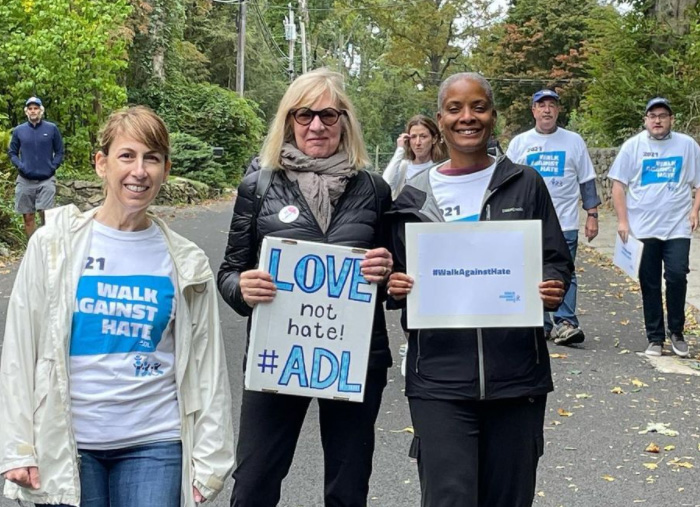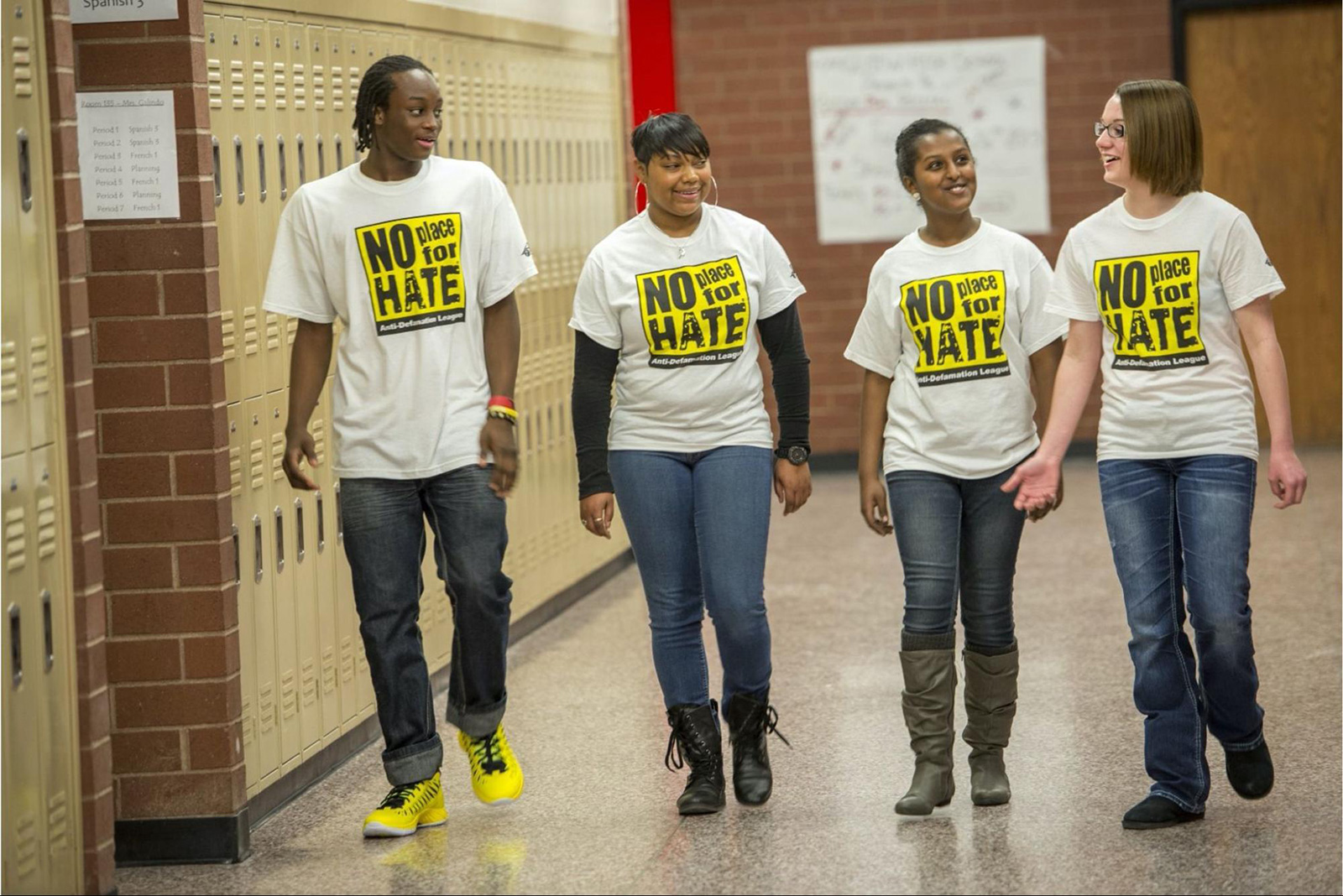A Look at the Work of Combating Hate With ADL's Debora Lehrer
I've had the great privilege of working with the Anti-Defamation League and the super-talented Debora Lehrer over the years. Whether you are familiar with their brand or not, I'm sure you have felt their impact. ADL is among the most active advocates in combating hate in our country and has built a passionate community of supporters along the way. I recently sat down with Debora to get an inside look into the very important world of combating hate and the role that a strong community plays in supporting their efforts.
Damian Bazadona: ADL/The Anti-Defamation League does such incredible work combating hate across the country and has built a remarkably engaged community. What would you say is at the core of why the community remains so actively engaged?
Debora Lehrer: This is a great question and one we think about and focus on constantly. I think there are a number of reasons we have such an engaged community, but one of the major contributors that we are all reading about in our country as we have this interview is that there's been a lot of hate recently.
Over the century-plus since ADL was founded in 1913, we have cemented our reputation as the leading organization fighting antisemitism and hate of all kinds. We have built a great deal of credibility and expertise in that time, which is why people turn to us early and often.
And unfortunately, we have witnessed historic levels of hate in this country over the past few years. It's been almost pervasive and a constant presence in the news cycle. We've been tracking antisemitic incidents for over 40 years, and in the last few years we've seen some records. Hate crimes have been high, and that's even with the knowledge that they are often underreported. We've seen alarming rises in hate aimed at the AAPI community, the Black community, the LGBTQI+ community, immigrants, Latin Americans and so many others. Sadly, we've also experienced deadly violence that is fueled by hate and extremism.
Being an anti-hate organization, ADL is where so many people turn when they experience, hear about or read about these terrible trends and occurrences. Our community turns to us because they know we'll have data, resources for understanding the data and the trends we're seeing, ways for them to take action in their own communities and, often, reasons for hope even when it seems unlikely.
It's so impressive to see how far ADL's work spans in combating hate. How does that practically play out in the work your organization does?
We provide resources and actions for everyone. Part of why we are able to keep our community so engaged is because our work affects and impacts so many people in a community. Our anti-bias programs reach over a million students each year. We have educational resources for families, educators, administrators and students at all levels. ADL partners with civil rights organizations to enhance advocacy efforts for all marginalized communities. We engage with synagogues across the country to address issues of antisemitism and safety. Our Center on Extremism works closely with law enforcement as they monitor and disrupt extremist activity, often before it has the chance to turn violent. As online hate has erupted across platforms, our Center for Technology and Society offers ways to report online harassment, while at the same time working with tech companies to address fundamental platform governance issues.
And we are also focused on not just providing resources and working on behalf of our community, but on making sure they have ways to join us on the frontlines themselves. Whether declaring their school No Place for Hate, contacting representatives to push for key legislative action, reporting antisemitic or bias incidents, Walking Against Hate or attending our annual Never Is Now Summit, the ADL community is constantly being given opportunities to use their voice to help fight hate for good.
I know aside from having a sizable digital footprint, you also have a physical presence with offices in many places across the country. How does that impact the depth of your relationship with your community?
A key differentiator for ADL is our regional office network. We have 25 offices around the country that cover every community. These offices provide ADL the opportunity to engage on local levels and address the issues that are affecting communities on the ground. It is our regional offices who are responding to incidents when they occur. When the terrifying hostage crisis unfolded in Colleyville, Texas, it was our regional director who was on the ground, working with the Beth Israel community and law enforcement as the day's events unfolded.
So many people in the ADL community have their first ADL encounter through one of our regional offices. This often provides them a more personalized experience with ADL because they are engaging with issues that are close to home. They always have the option of activating with ADL at a national level, and no doubt hear from us on our national channels, but I firmly believe it is our regional offices that keep our supporters enthusiastically engaged through their work on the ground.
Do you find that this drive for action is something that comes naturally to the ADL community? Or is it something that ADL works to cultivate? It's one thing to get people to be a part of the community, it's another for them to be active.
With the rise in hate, I hear from so many people that they feel helpless and are looking for something to do to fight back. That's where ADL comes in. We are incredibly focused on making sure that the vast majority of our communications, no matter the channel, provide ways to take action alongside key information and resources.
A trend we've seen with our community is that we do such a good job of keeping them informed of trends and incidents that the obvious response to reading something like our annual Audit of Antisemitic Incidents is to say "So, what can I do?" Part of this being the common response also speaks to the kinds of people who join the ADL community. The vast majority of them are joining the community because they care about fighting hate and the work ADL does every day. Being a concerned member of society is often correlated with wanting to be an active member of society, fighting for justice and fair treatment for all. This is something we keep in mind as we look to bring more people into our community as well.
I've long admired ADL's ability to engage and respond quickly against the hate that we are reading in the headlines. With the importance of speed in responding to often complex, fast-moving stories, I'm sure you've learned a lot in how to navigate communication. What's the biggest "no-no" in how and when you engage with the ADL community?
This is something we've unfortunately become quite adept at doing. By far the biggest no-no in my book would be not communicating internally before we communicate externally. When an incident occurs, we are responding in so many ways. Our Center on Extremism is most likely in touch with law enforcement. A regional director will be on the ground at the site of the incident. Our Center for Technology and Society will be looking to see how things play out online. Our Government Relations team is reaching out to lawmakers and partners. With so much happening at one time, it is critical that the marketing team and the communications team are looped into everything happening and ensuring that no matter who at ADL is responding where, we are doing so with one voice and message. This is critical for our community, who have their eyes turned to us in times of crisis. When our CEO is on CNN, we want that message to be similar to what's in our tweets, our emails, on our website, etc., so that wherever people are hearing from us, they are getting the right message, resources and ways to take action. This is going to be the surest way to keep supporters informed, engaged and active.
What investments are necessary to continue to build, grow and maintain the ADL community? As an organization that's over 100 years old, how do you reinvest to remain relevant in building new supporters while keeping a bond with existing supporters?
Another question that we think about and talk about every day. A key here is recognizing that our supporters are going to be showing up in different places and we need to recognize that. For instance, we know that our direct mail audience tends to be an audience that has been supporting ADL longer than some other channels. We also have learned that our email audience tends to be interested in certain topics more than others. We have been investing more and more in research and measurement tools to track what's resonating and where so we can better keep these existing audiences engaged. We're also constantly testing acquisition methods on different channels alongside continued integration of multi-channel campaigns.
At the same time, we also need to be focused on awareness building and bringing in new generations of supporters. This means not just investing in things like research surveys, but also new platforms and channels. We've recently been doing more with texting. We use our advocacy platform as a way to generate new leads by bringing people in on certain issues they care deeply about that we address. Our social team is constantly looking at new platforms and ways to engage new audiences there.
Another key way we look to bring in new supporters is by investing in partnerships. Innovation and partnerships have been key drivers of our approach the past few years. By forming strategic partnerships with like-minded organizations, we are reaching thousands more potential ADL supporters who we know are already motivated by at least one or more of the issues ADL addresses.
How do you navigate being at odds with your community? Sometimes your community may want something from you that you're not able or willing to do.
I think this is something every organization and company grapples with, whether you are selling consumer product goods or are mission-driven like ADL. At ADL, we are, of course, focused on what our community wants and expects from us, and are constantly monitoring that feedback. However, ADL has always been driven by principles and it is those principles which drive our policies and positions. It's never politics and, at times, it's not what everyone in our community wants, either. Part of staying principled, and adhering to our mission "to stop the defamation of the Jewish people and to secure justice and fair treatment to all" is knowing we aren't always going to make everyone happy all the time.
Recognizing that we are sometimes going to be at odds with portions of our community also means that we are hyper-aware of how we message our positions. We look to explain our statements and actions thoroughly and lay out the ways they are based on principle, precedent and priorities. If there are those in the community that still don't agree, we respect their disagreement, try to learn from it, but ultimately, we're going to keep calling balls and strikes.
Building Passionate Communities is a regular interview series where Damian Bazadona, president and founder of Situation Group, sits down with extraordinary leaders at organizations that have paved the way in both cultivating passionate communities and driving them to meaningful action. For more about Building Passionate Communities, or to be considered for the series, please get in touch.
















